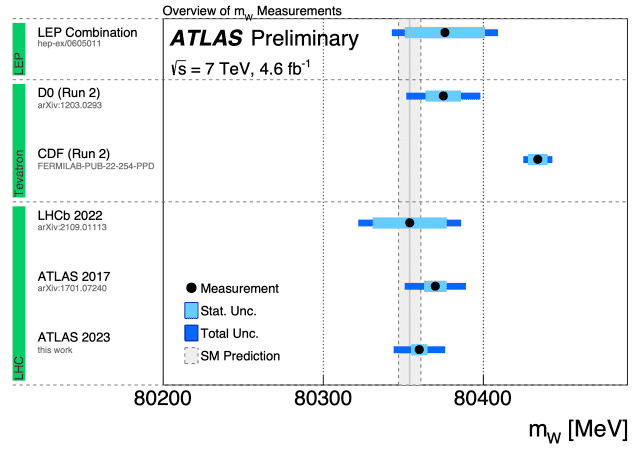The ATLAS experiment at the Large Hadron Collider (LHC) has made a new measurement of the W boson mass (actually just a reanalysis of 2011 data) with high precision (via a post at the Physics Forums).
While the W boson mass is a free parameter in the Standard Model of Particle Physics, it is also has a functional relationship to other free parameters in the Standard Model including the electromagnetic and weak force coupling constants, the Z boson mass, and to a much smaller extent, the Higgs boson and top quark masses, that can assist in finding a global electroweak fit to the value of this parameter. Specifically:
In the Standard Model, the W boson mass is closely related to the strength of the electroweak interactions and the masses of the heaviest fundamental particles, including the Z boson, the top quark and the Higgs boson. In this theory, the particle is constrained to weigh 80354 million electronvolts (MeV), within an uncertainty of 7 MeV. . . .
In its new study, ATLAS reanalysed its 2011 sample of W bosons, improving the precision of its previous measurement. The new W boson mass, 80360 MeV with an uncertainty of 16 MeV, is 10 MeV lower than the previous ATLAS result and 16% more precise. The result is in agreement with the Standard Model.
The new measurement if close to the global fit value, and to past precision measurements, while it is far from an outlier result derived from a reanalysis of the CDF experiment at the Tevatron collider (which ceased to operate long ago).
The outlier CDF value is inconsistent at the two sigma level with all of the other W boson mass measurements that are outstanding from LEP experiments, from the D0 experiment at the Tevatron collider, from the LHCb experiment, and from ATLAS. All of the other W boson mass measurements, unlike the CDF value, also overlap the global electroweak fit value.
This outlier status is probably due to a flawed analysis of the old data by CDF.

No comments:
Post a Comment